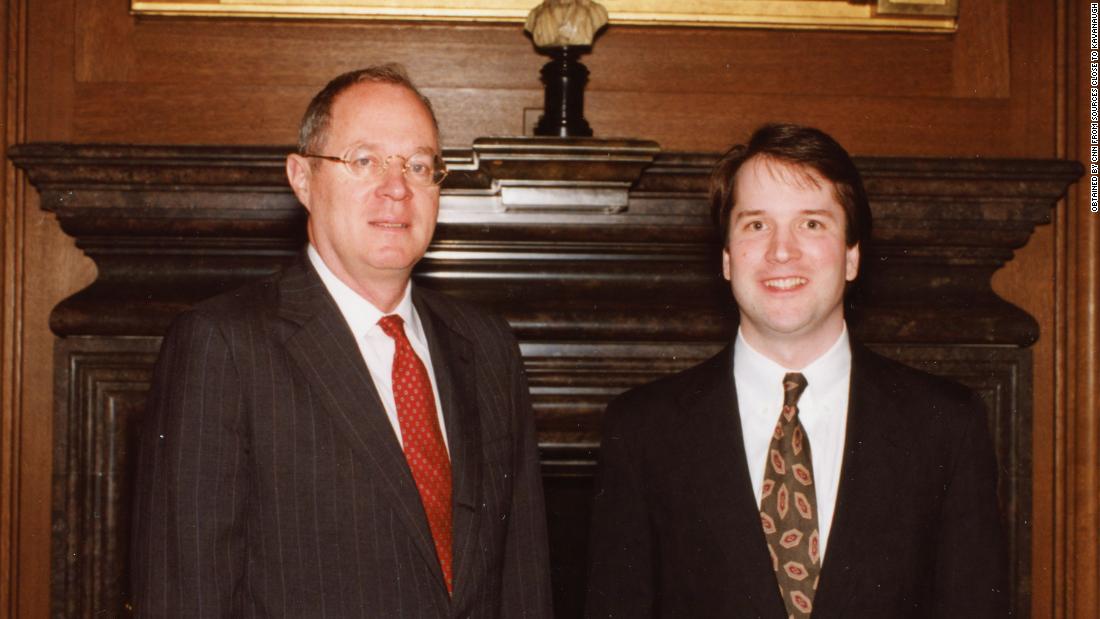Here’s the thing: The battle between Kavanaugh and the 5th Circuit is not just another legal feud—it’s a clash of ideologies, jurisdictions, and election rules that could shape the future of U.S. democracy. This isn’t just about who wins or loses in court; it’s about how our electoral system operates and whether certain rules can withstand judicial scrutiny. So, buckle up because this is gonna get interesting.
Picture this: You’re sitting in your living room, scrolling through the news, and then bam! You come across a headline that says “Kavanaugh vs. 5th Circuit.” Sounds like a blockbuster movie, right? But trust me, it’s way more intense than any Hollywood drama. This legal showdown revolves around election rules—specifically, whether states can impose certain restrictions on voting or if those rules violate constitutional rights. It’s like a tug-of-war between the judiciary and the legislative branch, with the American voter caught in the middle.
Now, before we dive headfirst into the nitty-gritty details, let’s set the stage. The Supreme Court, led by Justice Kavanaugh, often finds itself at odds with lower courts like the 5th Circuit when it comes to interpreting election laws. Why does this matter? Well, elections are the backbone of democracy, and if the rules governing them are inconsistent or unclear, it undermines public trust. So, as we unpack this story, we’ll explore what’s at stake, who’s involved, and why you should care. Ready? Let’s go!
Read also:Remoteiot Vpc Review Raspberry Pi The Ultimate Guide For 2023
Understanding the Players: Who’s Who in This Legal Drama?
Let’s break down the key players in this election rule clash. First, there’s Justice Brett Kavanaugh, a conservative justice appointed to the Supreme Court in 2018. Kavanaugh has been vocal about his belief in states’ rights and limiting federal intervention in election matters. On the other side, we have the U.S. Court of Appeals for the 5th Circuit, known for its more liberal leanings in certain cases. This circuit covers states like Texas, Louisiana, and Mississippi, where election laws are often hotly contested.
But wait—there’s more. The players don’t stop at the judges. We also have state governments, voting rights advocates, and even ordinary citizens who are deeply invested in how these rules play out. It’s like a game of chess where every move has far-reaching consequences. And oh, don’t forget the media circus that surrounds high-profile legal battles like this one. Everyone’s got an opinion, but whose side is the law on?
Biography of Brett Kavanaugh: The Man Behind the Gavel
Before we delve deeper into the specifics of Kavanaugh vs. 5th Circuit, let’s take a moment to understand the man himself. Brett Kavanaugh is no stranger to controversy. Born in 1965 in Washington, D.C., Kavanaugh grew up in a politically active family. He attended Yale Law School and later served as a clerk for Justice Anthony Kennedy, one of the most influential figures in modern Supreme Court history.
Here’s a quick snapshot of Kavanaugh’s career:
| Full Name | Brett Michael Kavanaugh |
|---|---|
| Birthdate | February 12, 1965 |
| Education | Yale Law School |
| Appointed to Supreme Court | 2018 by President Donald Trump |
| Key Judicial Philosophy | States’ rights, originalism, and limiting federal overreach |
Now that we’ve met Kavanaugh, let’s shift our focus to the 5th Circuit and why it’s such a crucial player in this legal drama.
Why the 5th Circuit Matters: A Regional Perspective
The U.S. Court of Appeals for the 5th Circuit might not be a household name, but it’s a powerhouse in the world of federal jurisprudence. Covering three Southern states—Texas, Louisiana, and Mississippi—the 5th Circuit often deals with cases involving civil rights, voting laws, and constitutional challenges. It’s a region where political tensions run high, and election rules are a frequent source of conflict.
Read also:Undress The Art Of Selfexpression And Confidence
What makes the 5th Circuit unique is its history of balancing conservative and liberal rulings. While it’s known for upholding state sovereignty in many cases, it has also struck down discriminatory voting practices when necessary. This duality makes it a fascinating court to watch, especially in the context of Kavanaugh’s more rigid approach to election rules.
Key Cases That Shaped the 5th Circuit’s Stance
Let’s rewind a bit and look at some landmark cases that have shaped the 5th Circuit’s perspective on election laws:
- Veasey v. Perry (2016): This case challenged Texas’s strict voter ID law, which the 5th Circuit eventually ruled as discriminatory against minority voters.
- League of United Latin American Citizens v. Perry (2006): In this case, the court reviewed Texas’s redistricting plan, finding that it violated the Voting Rights Act.
- Abbott v. Perez (2018): The Supreme Court, including Kavanaugh, weighed in on this case, affirming parts of the 5th Circuit’s ruling but overturning others.
These cases highlight the ongoing tension between federal oversight and state autonomy—a tension that lies at the heart of Kavanaugh vs. 5th Circuit.
The Election Rule Clash: What’s Really at Stake?
At the center of this legal battle are election rules that determine how, when, and where people vote. Kavanaugh and the 5th Circuit often find themselves at odds over issues like voter ID requirements, early voting periods, and mail-in ballots. These might seem like small details, but they have massive implications for voter accessibility and fairness.
For example, states that impose strict voter ID laws argue that they’re preventing fraud, but critics say these laws disproportionately affect low-income and minority voters. Meanwhile, rules around mail-in ballots have become increasingly contentious, especially in the wake of the 2020 election. It’s like trying to solve a Rubik’s Cube where every twist creates a new problem.
Statistical Insights: The Impact of Election Rules
Data doesn’t lie, and the numbers tell a compelling story about how election rules affect voter turnout:
- Turnout Rates: States with fewer restrictions on voting tend to see higher turnout rates, often by as much as 10-15%.
- Mail-in Ballots: In 2020, over 100 million Americans voted by mail, a significant increase from previous years.
- Voter Suppression: Studies estimate that strict ID laws could disenfranchise up to 11% of eligible voters nationwide.
These stats underscore the importance of striking the right balance between security and accessibility in election rules.
Legal Precedents: Lessons from the Past
History has a way of repeating itself, and the legal battles over election rules are no exception. From Bush v. Gore to Shelby County v. Holder, the courts have grappled with questions of fairness and equality in voting. These precedents shape how judges like Kavanaugh and the 5th Circuit approach modern cases.
One notable precedent is the Voting Rights Act of 1965, which aimed to eliminate discriminatory voting practices. While parts of this act were weakened in recent years, its principles still guide much of the litigation around election rules today. It’s like building a house on shifting sand—every new ruling changes the foundation.
How Kavanaugh’s Philosophy Fits In
Kavanaugh’s judicial philosophy centers on states’ rights and originalism, meaning he interprets the Constitution based on its original meaning. This approach often leads him to side with states when they impose election rules, even if those rules face legal challenges. It’s a stance that aligns with many conservatives but frustrates voting rights advocates who argue for greater federal oversight.
Public Perception: What Do Voters Think?
Public opinion plays a crucial role in shaping the debate over election rules. Surveys show that most Americans support measures like early voting and mail-in ballots, viewing them as essential for ensuring fair and accessible elections. However, opinions diverge sharply on issues like voter ID laws, with conservatives more likely to support them and liberals opposing them.
Social media has amplified these debates, turning election rules into a hot-button issue. Hashtags like #VoterSuppression and #ProtectOurVote trend during election cycles, reflecting the passion and polarization surrounding this topic. It’s like a digital town hall meeting where everyone’s voice can be heard, but not always agreed upon.
How the Media Shapes the Narrative
The media plays a pivotal role in framing the Kavanaugh vs. 5th Circuit battle. News outlets often highlight the most dramatic aspects, such as heated oral arguments or unexpected rulings. This coverage can influence public perception, sometimes oversimplifying complex legal issues in the process. It’s like watching a movie trailer instead of the full film—you get the gist, but not the whole story.
Potential Outcomes: What’s Next for Election Rules?
As Kavanaugh and the 5th Circuit continue their legal tug-of-war, several potential outcomes could emerge. The Supreme Court might issue a definitive ruling that settles the matter once and for all, or it could punt the issue back to lower courts for further review. Either way, the implications for election rules will be significant.
One possible scenario is that the courts will establish clearer guidelines for what constitutes a fair and constitutional election rule. This could lead to more uniformity across states, reducing confusion and increasing voter confidence. On the flip side, if the courts remain divided, the patchwork of rules could persist, leaving voters and administrators navigating a complex landscape.
What Does This Mean for You?
Ultimately, the Kavanaugh vs. 5th Circuit showdown affects you, the voter. Whether you’re concerned about access to the polls, the integrity of the vote count, or the balance of power between federal and state governments, this legal battle touches on issues that matter deeply. Staying informed and engaged is the best way to ensure your voice is heard in this ongoing conversation.
Call to Action: What Can You Do?
Now that you’ve got the scoop on Kavanaugh vs. 5th Circuit, it’s time to take action. Here’s what you can do:
- Stay informed by following reliable news sources and legal analysis.
- Engage with your local and state representatives to advocate for fair election rules.
- Share this article with friends and family to spark meaningful conversations about democracy.
Remember, the future of our electoral system depends on all of us. By staying involved and informed, we can help ensure that every vote counts—and that’s something worth fighting for.
Conclusion: The Bigger Picture
To sum it up, Kavanaugh vs. 5th Circuit is more than just a legal battle—it’s a reflection of the broader struggles within our democracy. From states’ rights to voting accessibility, the issues at play touch every corner of American life. As we’ve explored the key players, cases, and implications, one thing is clear: the stakes are high, and the outcome will shape the future of our elections.
So, what’s next? Only time will tell, but one thing is certain: the conversation isn’t over. Whether you’re a legal scholar, a voting rights advocate, or just a concerned citizen, this is a story worth following. And hey, if you’ve made it this far, congrats—you’re now part of the conversation. Keep the momentum going by sharing your thoughts and staying engaged. After all, democracy works best when everyone’s voice is heard.
And with that, we’ll wrap things up. But don’t forget to leave a comment, share this article, or check out more content on our site. Together, we can keep the dialogue going and work toward a brighter, more equitable future for all.
Table of Contents
- Kavanaugh vs. 5th Circuit: Election Rule Clash - A Deep Dive into the Legal Showdown
- Understanding the Players: Who’s Who in This Legal Drama?
- Biography of Brett Kavanaugh: The Man Behind the Gavel
- Why the 5th Circuit Matters: A Regional Perspective
- Key Cases That Shaped the 5th Circuit’s Stance
- The Election Rule Clash: What’s Really at Stake?
- Statistical Insights: The Impact of Election Rules


